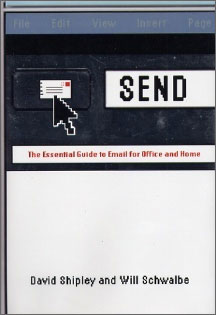 |
 David Shipley and Will Schwalbe
David Shipley and Will Schwalbe
Send:
The Essential Guide to Email for Office and Home
Reviewed by: Rick Kleffel © 2007
Alfred A. Knopf / Random House
US First Edition Hardcover
ISBN 978-0-307-25364-3
248 Pages; $19.95
Publication Date: 04-10-2007
Date Reviewed: 05-30-2007
Index:
Non-Fiction
We all like to think that we know it all, that we've taken into account the advice of our predecessors and that our actions are informed by the knowledge of their mistakes and how to avoid them. Generally, this is posited as, "Those who do not learn history are doomed to repeat it." The problem with this aphorism is that it's tougher to learn from history than it seems, even if the history in question is our own personal history. Few of us make a mistake just once, and it’s not because we're uninformed. We're too busy to be simply informed of wisdom. We have to be repeatedly reminded, in a manner that is clear, concise and enjoyable to experience. Otherwise, we'll tune out, with a shrug and an, "I know that already."
The virtue of David Shipley and Will Schwalbe's 'Send: An Essential Guide to Email for Office and Home' is not simply all the new information it offers about the ever-evolving hazards of email. Presentation is key here, that is: good writing and layout make one hell of a difference. You may have heard some of what you read here before, but you've not seen it so concisely and readably presented. 'Send' lives up to its subtitle and more. Impeccably organized, ever cleverly written, this book offers common sense with enough clarity that it might penetrate the crap-drenched corridors of your brain and save you just once, just one time, from doing something really stupid. And once that happens, you'll find yourself thinking about other advice within and preventing further self-inflicted injuries.
'Send' benefits from being a small book with a careful focus. Seven major sections outline the essentials. The introduction asks and answers the question, "Why Do we Email so Badly?" The reasons are not what you’d expect. We then go through the sort of tutorial that should be given to every user before they are given access to their email account. The authors discuss "When Should We Email", "The Anatomy of an Email", "How to Write (the Perfect Email)", "The Six Essential Types of Email", "The Emotional Email" and "The Email That Can Land You In Jail".
Each section is laid out in a manner that is pleasing to the eye and easy to read. The authors told me in an interview that they did, in fact, want the book itself to resemble a well-written email, and in this they have succeeded admirably. The problem with many self help-books, a genre this book belongs to that I generally dislike — greatly — is that they are difficult, smarmy, or unpleasant to read. Great advice is useless advice if it goes unread, or if when read, one is inclined to ignore it because the authors seem to be lording it over the unfortunate reader. Shipley and Schwable avoid all of these traps and it's something of a miracle.
They're engaging writers who use a bit of humor, but avoid jokiness. The advice is always solid and never concealed behind attempts to overwrite. They put it in blue boxes fercrissakes, so you can't miss it. Here's a book where layout plays a major and helpful role. You can look at this book chock-full of advice and not have it hurt your mind so badly that you decide not to read it. Instead it grabs your attention and rewards that attention.
What's important here is the influence that email's style has on our interactions beyond the world of email. We no longer simply use email to replace post office letters. Email's ease-of-use encourages communications that might not otherwise transpire, and the style of those communications can creep into our personal lives. The manners, etiquette and common sense you'll find here will have implications and effects far beyond the world of you and your email. This is history that need not be repeated. It can be learned, without the pain. Or at least, if you feel the pain yourself, you might know just enough not to extend it beyond the confines of your own tiny mind. One lesson learned. One email left unsent. One comment left unsaid. You've read this book. You've changed your life—for the better.
|
 |
